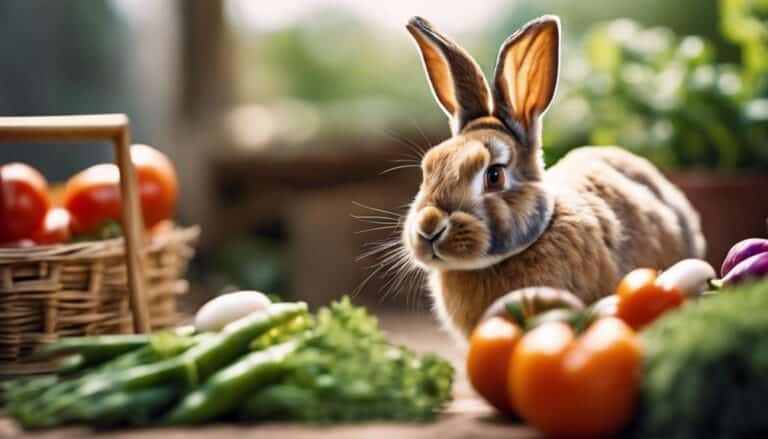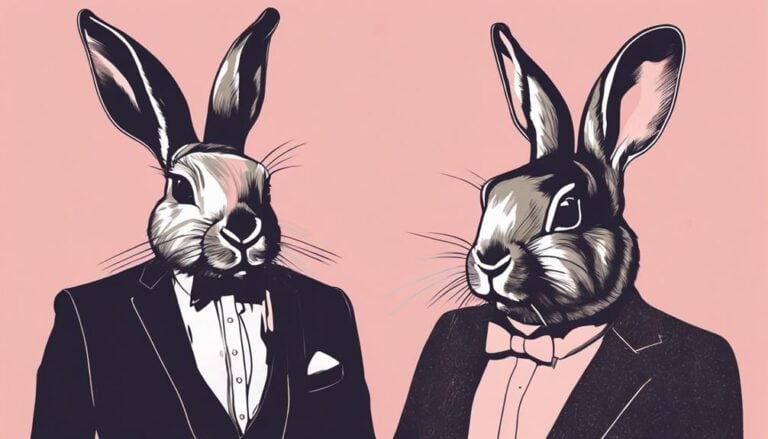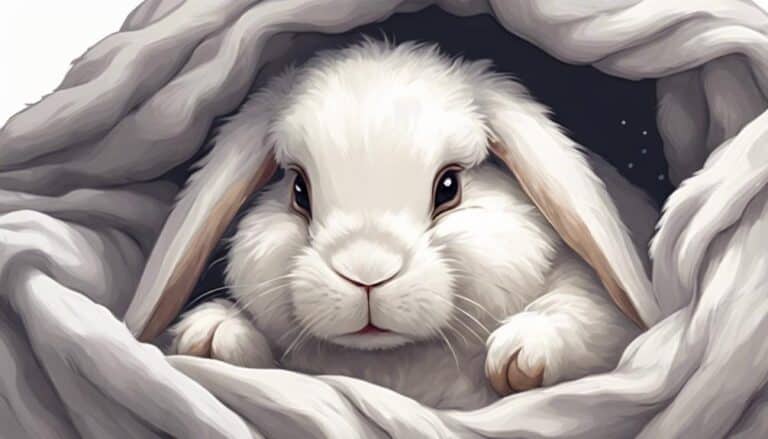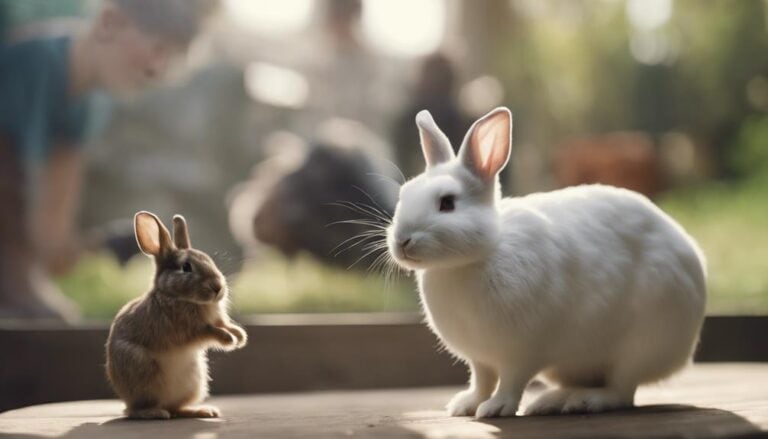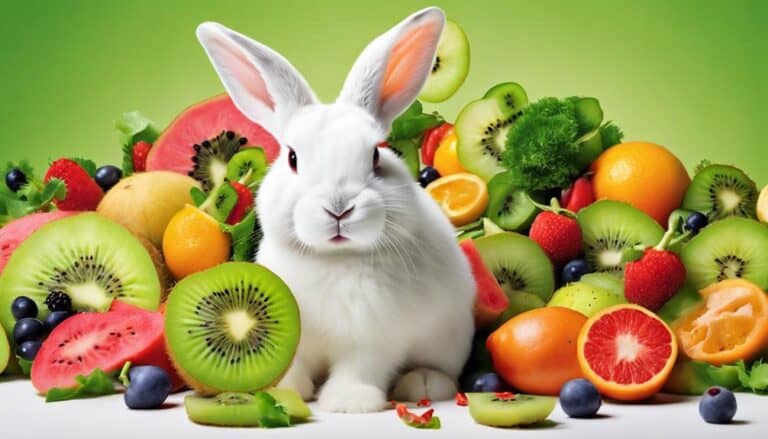So, you're thinking of having a rabbit as a pet and wondering if it's going to bring you bad luck? That's an interesting question.
Let's dive into the world of rabbit superstitions and see if there's any truth to this idea.
First off, it's hard to believe that such cute and gentle creatures could possibly bring misfortune into our lives.
I mean, have you ever seen a rabbit and not smiled? They're just so adorable!
But, superstitions are superstitions, and people believe what they want to believe.
So, where did this idea even come from?
Is it just a silly old wives' tale, or is there some historical basis to it?
Let's explore this further and find out if having a rabbit as a pet is really going to curse you with bad luck.
Contents
- 1 Key Takeaways
- 2 Origins of the 'Rabbit, Rabbit' Superstition
- 3 Different Global Beliefs About Rabbits
- 4 Cultural Significance of Rabbits as Pets
- 5 Common Misconceptions About Rabbit Ownership
- 6 Benefits of Having Rabbits as Pets
- 7 Tips for a Happy Rabbit-Human Relationship
- 8 Rabbit Care Essentials and Best Practices
- 9 Debunking the Myth: Rabbits and Bad Luck
- 10 Conclusion
Key Takeaways
So, you might be wondering if having rabbits as pets is bad luck. Well, the truth is that cultural views on this vary widely. In some cultures, rabbits are actually seen as symbols of good luck, while in others, they're associated with bad luck.
In some cases, rabbits are even linked to trickery, which might make people hesitant to keep them as pets. But here's the thing: having a rabbit as a pet can actually bring you companionship, good luck, and positivity.
The key to making this work is to provide your rabbit with proper care and attention. When you do, you'll find that they thrive as pets, and any superstitions about bad luck just melt away. At the end of the day, the idea that rabbits bring bad luck is just that – a superstition, not a universal truth.
Origins of the 'Rabbit, Rabbit' Superstition
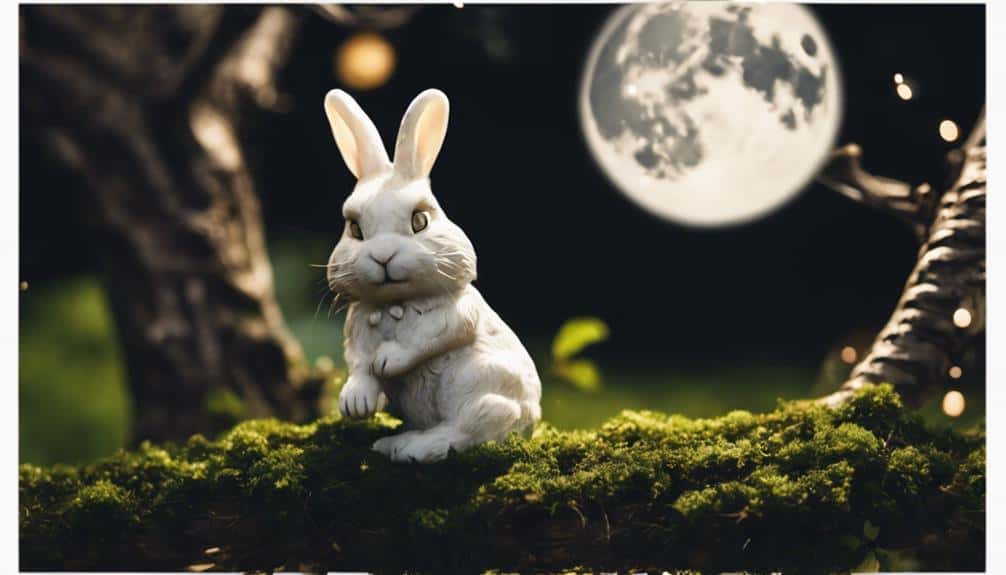
The 'rabbit, rabbit' superstition, which involves saying those words on the first day of the month to bring good luck, has its roots in Britain. This tradition, which is believed to bring good fortune for the rest of the month, has been passed down through generations.
Some people take it a step further and say 'rabbit, rabbit' multiple times. There are even variations, like saying 'white rabbit' three times at midnight for extra luck. In the United States, especially in regions like New England, this custom has been adopted and shared among families and friends.
The cultural significance of this saying is highlighted by storyteller Sue-Ellen Stillwell-Jones, who learned it from other storytellers in the Midwest. Even prominent figures like President Franklin Delano Roosevelt have been associated with this superstition, showing just how widespread it is.
The fact that people believe saying 'rabbit, rabbit' on the first day of the month can have a positive influence showcases the enduring connection between rabbits and good luck in various cultures.
Different Global Beliefs About Rabbits
So, let's dive into the fascinating realm of rabbit superstitions from around the world.
From cute and cuddly to mystical and mysterious, rabbits have been viewed in many different ways across various cultures.
In some societies, rabbits are seen as symbols of good luck, fertility, and abundance. For instance, in Chinese culture, rabbits are considered one of the twelve zodiac animals, representing gentle and sensitive qualities.
On the other hand, in some African cultures, rabbits are believed to possess magical powers, with their speed and agility making them a symbol of protection and swiftness.
Rabbits have also been woven into the fabric of folklore and myths in many cultures. In European folklore, the rabbit is often depicted as a trickster figure, outsmarting predators and getting into all sorts of mischief.
In Japanese culture, the rabbit is associated with the moon, with legends telling of a rabbit that pounds mochi (rice cakes) on the moon's surface.
From being seen as gentle creatures to being associated with magical powers, rabbits have been imbued with a rich cultural significance across the globe.
Rabbit Superstitions Worldwide
Rabbits have some pretty interesting superstitions attached to them across different cultures.
In many societies, they're seen as symbols of good luck, fertility, and rebirth. For example, in Japanese culture, they're associated with the moon goddess and are even believed to live on the moon.
But that's not the case everywhere. In some African cultures, rabbits are viewed as tricksters, kind of like Anansi the spider.
And in European folklore, things get even more complicated. Rabbits are often seen as bad luck, so much so that fishermen would turn back if they saw one before setting sail.
In European superstitions, there are some pretty negative connotations surrounding rabbits. For instance, if a pregnant woman saw a hare, she risked having a child with a hare-lip deformity. And if you ate rabbit meat, you might just transfer melancholy to yourself.
In medieval European folklore, hares were even portrayed as witches' familiars, and crossing paths with one was seen as unlucky.
All these superstitions surrounding rabbits offer a fascinating look into the varied cultural beliefs and interpretations of these creatures.
Cultural Views on Rabbits
Rabbits have different meanings in various cultures around the world. These beliefs shape how people view them and the roles they play in society.
In some European cultures, like in Germany, rabbits symbolize good luck and prosperity. For example, people in these cultures say 'Rabbit, rabbit, rabbit' out loud three times on the first day of each month to bring good luck throughout that month. This practice is believed to bring positive outcomes and ward off bad luck.
On the other hand, in some Asian cultures, rabbits are associated with the moon and symbolize longevity and immortality. In Chinese folklore, the Moon Goddess Chang'e is often depicted with a rabbit companion, which represents good fortune and happiness.
It's interesting to see how different cultures view rabbits in their own unique ways, showcasing the diversity of cultural beliefs and interpretations about these furry creatures.
Folklore and Rabbit Symbolism
Rabbits have been perceived and valued differently across cultures worldwide, and their symbolism varies greatly.
In many cultures, rabbits are associated with good luck and fortune. For instance, in some parts of Europe, they're seen as symbols of abundance and fertility, bringing prosperity and blessings to households. The idea of the 'lucky rabbit's foot' actually originated from African American folklore, and it's believed to bring good fortune to those who possess it.
But rabbits aren't always viewed in a positive light. In Celtic folklore, they were considered creatures with supernatural abilities, able to move between worlds and bring messages from the spiritual domain.
On the other hand, in some Asian cultures, rabbits are associated with the moon and are seen as symbols of longevity and immortality.
The diverse interpretations of rabbit symbolism really highlight the rich tapestry of beliefs that exist around the world. It's amazing to see how these small creatures have captured the imagination and reverence of different societies throughout history.
Cultural Significance of Rabbits as Pets
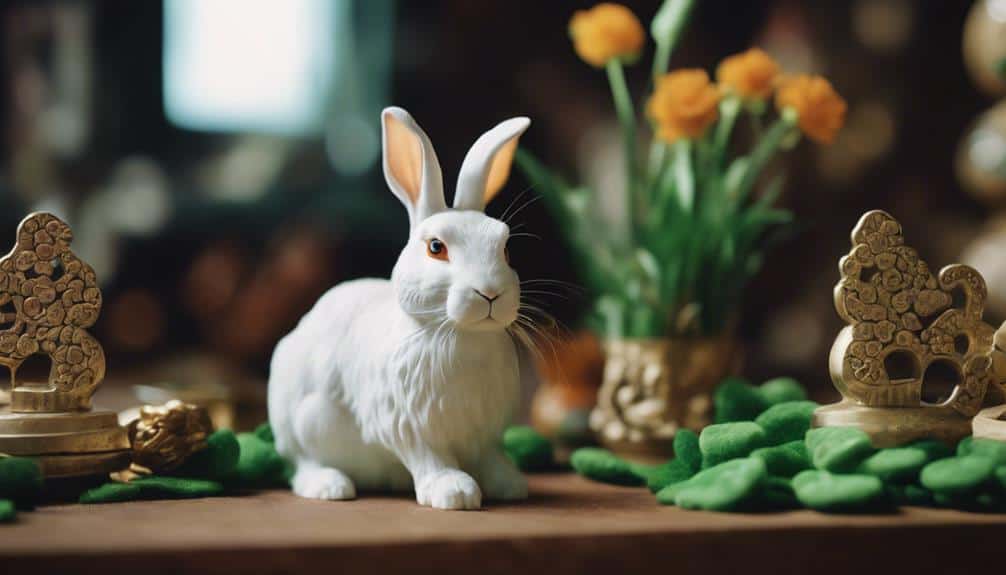
Rabbits have a special meaning in many cultures. They often symbolize good things like luck, having kids, and living a long life.
Because of these symbolic meanings, people have lots of superstitions about pet rabbits. They believe that having a rabbit in the house brings good energy.
If we look at why rabbits are important in different cultures, we can understand why people in many parts of the world love having them as pets.
It's not just about how cute they're – it's about the deep beliefs people have about these animals.
Rabbit Symbolism in Cultures
Rabbits mean different things to different cultures, and they're really important as pets, symbolizing a bunch of virtues and stuff.
In Chinese culture, rabbits stand for longevity, peace, and prosperity. If you're born in the Year of the Rabbit, people believe you're vigilant, witty, quick-minded, and ingenious.
Across many cultures, rabbits are associated with innocence, purity, vulnerability, fertility, abundance, and creativity – that's why they're popular pets. In Chinese mythology, rabbits are connected to the moon goddess and live on the moon, where they pound mochi in Japanese folklore.
In some African traditions, rabbits are seen as tricksters, like Anansi the spider, and are portrayed as cunning and clever in stories. Rabbits also symbolize spring, renewal, and new life, embodying feminine and nurturing energies in various cultural contexts.
The fact that rabbits have so many different meanings attached to them is a big part of their enduring appeal as pets in different societies.
Superstitions About Pet Rabbits
Rabbits have a special place in many cultures, and it's not just because they're cute and cuddly. Keeping them as pets is believed to bring more than just companionship – it's also thought to bring good luck and positive energy into our lives.
In many cultures, rabbits are seen as good luck charms. They're believed to bring longevity, peace, and prosperity to their owners. This is especially true in Asian cultures, where rabbits are often kept as pets. The idea is that having a rabbit around can attract good fortune and positivity.
But it's not all sunshine and rainbows. In some African cultures, rabbits are seen as tricksters, and having one as a pet might not be so great after all. However, for many people, the positives outweigh the negatives. Rabbits are cherished as low-maintenance pets that offer good luck and companionship without demanding much space or exercise.
So, what do people believe about pet rabbits? Here's a quick rundown:
| Superstition | Cultural Influence |
|---|---|
| Good luck charm | Brings longevity, peace, and prosperity to owners |
| Symbol of innocence | Associated with new beginnings and positive energy |
| Companionship | Valued for providing good fortune and adaptability |
Common Misconceptions About Rabbit Ownership
So, you're thinking of getting a rabbit as a pet? That's great! But before you do, let's clear up some common misconceptions about rabbit ownership.
Rabbits aren't low-maintenance pets. They need proper housing, a balanced diet, regular grooming, and veterinary care. It's not just a matter of throwing some food in a cage and expecting them to thrive.
Another misconception is that carrots are enough. Rabbits love carrots as a treat, but a diet of only carrots is unhealthy and can cause digestive issues. You'll need to provide a varied diet that includes plenty of fresh veggies and hay.
Some people think rabbits are happy to live in small cages. Not true. Rabbits are active animals that need space to run, jump, and explore. You'll need to provide a large, rabbit-proofed area for them to do their thing.
Rabbits aren't always the best fit for young children, either. They require gentle handling and supervision, which can be tricky for little kids to manage. Rabbits need social interaction – they're social animals that thrive on companionship. Having a bonded pair can greatly enhance their quality of life.
Benefits of Having Rabbits as Pets
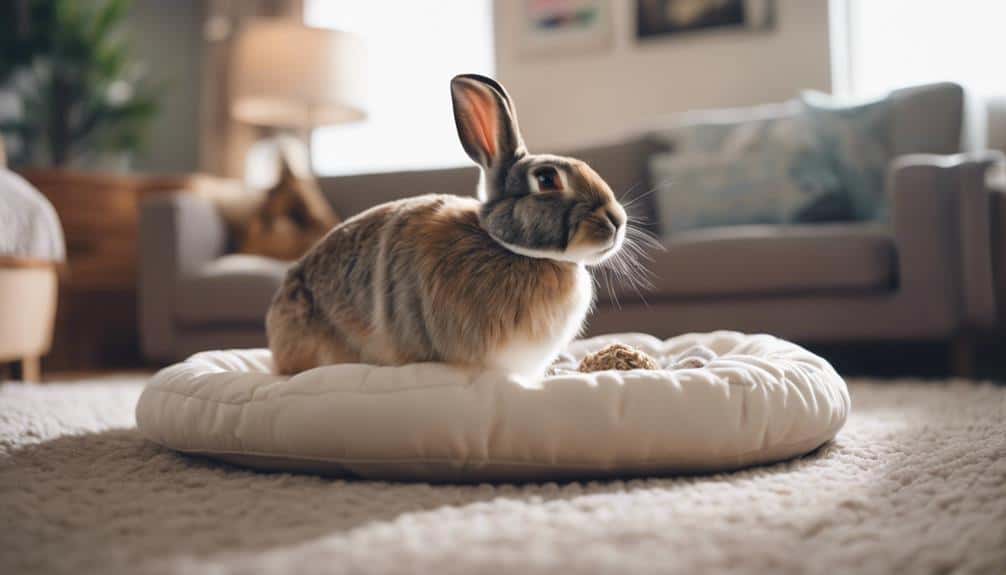
So, you're thinking of getting a rabbit as a pet? That's a great idea! Rabbits are super social, which means they love being around people and other rabbits. If you can give them enough space and attention, they'll make fantastic companions.
One of the best things about rabbits is that they’re really easy to care for. They only eat plants and veggies, which is great for their health and means you don’t have to worry about buying expensive meat-based food. Additionally, rabbits are usually low-maintenance when it comes to grooming, as they groom themselves quite well. This also means that many people wonder, “are rabbits hard to care for? ” The truth is, with a proper diet, a safe living environment, and regular vet check-ups, rabbits can thrive and bring joy to their owners with minimal hassle.
Plus, with over 70 different breeds to choose from, you're bound to find one that fits your style – whether you like big or small, fluffy or sleek, or any color you can imagine.
Rabbits are also super entertaining. They love to dig and burrow, which can be really fun to watch.
And if you're interested in breeding or showing rabbits, they're a great choice because they can have babies quickly.
Tips for a Happy Rabbit-Human Relationship
So, you want to build a strong and happy bond with your rabbit?
The key is to create an environment that lets them be themselves and thrive. Rabbits are super social, so consider getting them a buddy to hang out with. This will help reduce stress and boredom.
Next, make sure their space is safe and hazard-free. Remove anything that could harm them, secure wires, and rabbit-proof the area to avoid accidents.
A routine is also crucial – establish a regular schedule for feeding, exercise, and playtime. This will help your rabbit feel secure and strengthen your bond.
A healthy diet is essential, so provide a variety of fresh veggies and hay. This will keep them happy and healthy.
Also, offer plenty of hiding spots, tunnels, and toys to keep them curious and active. This will reduce stress and promote mental and physical well-being.
Rabbit Care Essentials and Best Practices
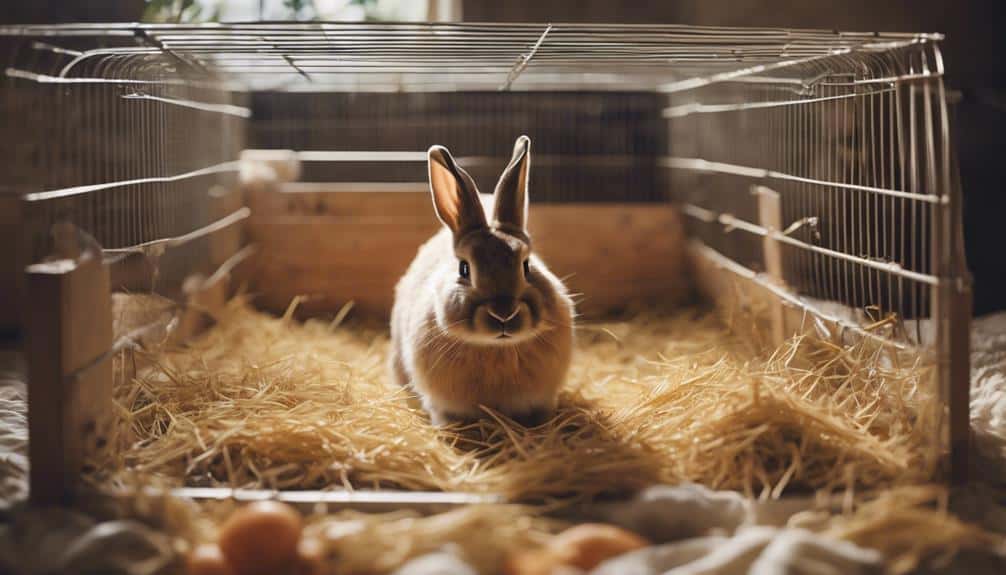
Creating a happy and healthy environment for your rabbit is all about following some essential care practices and best standards.
Rabbits are social animals, so they need to get out of their cage for at least 2-4 hours a day to exercise and interact with you. This helps prevent boredom and stress.
When it comes to food, it's vital to get the balance right. Hay should make up about 80% of their diet, with fresh veggies making up 10% and pellets another 10%. And don't overdo it on the treats – this can lead to obesity and digestive issues.
Regular check-ups with the vet are a must, as are nail trims and teeth filing. Keep an eye on your rabbit's droppings too – if you notice anything unusual, it could be a sign of illness.
When it comes to their home, your rabbit's cage should be a minimum of 2x4x4 feet in size. It should also have plenty of hiding spots, toys, and scratching posts to keep them mentally and physically stimulated.
Something to keep in mind is that rabbits are most active at dawn and dusk, so try to adjust your interaction and feeding schedules accordingly to meet their needs.
Debunking the Myth: Rabbits and Bad Luck
Let's dispel the superstition surrounding rabbits and bad luck by examining the origins and realities of this myth.
The belief that rabbits bring bad luck is deeply rooted in various cultures and superstitions.
For instance, in early British folklore, rabbits were associated with witches because it was believed that witches could transform into rabbits to hide from persecution.
In some European traditions, encountering a rabbit on the first day of the month was seen as an omen of misfortune.
But let's separate fact from fiction.
In reality, rabbits are gentle, social animals that can make wonderful pets.
There's no empirical evidence to support the notion that rabbits inherently bring bad luck.
Like any other pet, they need proper care, attention, and love to thrive.
Conclusion
The idea that rabbits bring bad luck is just an old superstition that started in Europe.
In reality, lots of cultures think rabbits are awesome pets that symbolize good things like good luck, fertility, and abundance.
A survey by the American Pet Products Association found that over 1.5 million households in the US have rabbits as pets.
That's a lot of people who love having rabbits around!
And for good reason – with the right care and attention, rabbits can be super fun companions.

